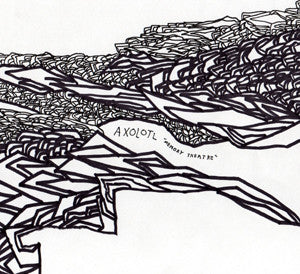Axolotl - Memory Theater - CD
Axolotl - Memory Theater - CD
Couldn't load pickup availability
Share
Memory Theater is an absolutely essential collection of the best of Axolotl's out of print CDRs and vinyl only releases. Karl Bauer spent quite a bit of time collaborating with acclaimed members of the noise underground before heading off on his own as Axolotl. In the last couple of years Axolotl have released numerous CD, CDR and vinyl releases, many of which quickly went out of print and started demanding some serious coin on eBay. Memory Theater collects the best of these out of print releases into one convenient package designed by Karl Bauer.
Julian Cope on Object Phantom:
So is the super scrawled longform meditational album OBJECT PHANTOM, by Axolotl. Released on Ron Schneidermann's superb Spirit Of Orr label, these four long mesmerizing pieces are played grooves of real cosmic use. Search them out because there are never many copies of each Spirit Of Orr release.
Volcanic Tongue on Chemical Theatre:
Here Karl Bauer uses violin, vocals, electronics and percussion to assemble huge fields of strafing white light that somehow reconcile the all-night flights of Terry Riley and the clouds of lung generated by Yoshi Wada with flickers of microdot vision and stoned oblivion poems. His set at Subcurrent was absolutely outstanding, accelerating Partch-like percussive miniatures into huge vertical architectures and this is another great blat of rigorously thought-out modern American sound. Highly recommended.
The Spooky Action Axolotl bio:
Axolotl is Karl Bauer, classically-trained violinist and a dedicated student of gnosticism, alchemy, and certain other materialist tendencies in psychology and philosophy. Bauer belongs to a small but potent association of young musicians, who draw upon the gestural economy and textural range of minimalism, and the visceral force of noise, while eschewing fashionable prohibitions against musicality, raw beauty, and thematic complexity. A certain postmodern timidity (offered up as boldness itself) compromises the rhetoric and methods of contemporary experimentalism. Noise, in both its reductionist and maximalist variants, too often provides the easy cover of superficial extremity to gloss over bankrupt ideas about aesthetics, ideas that essentially encourage the abandonment of extra-sonic ambitions and overtly expressive forms. With considerable dialectical subtlety, Axolotl refuses this refusal. Bauer's music displays, at every point, a committed engagement with the literally ecstatic capacities of sound. He manages an astonishing conservation of structure at the edge of a consuming incoherence. Indeed, this is the guiding metaphor of Axolotl's compositions: the development of forms out of formlessness; the description, by still-inchoate rhythms and figures, of processes that exceed any more definite articulation. In short, Bauer is that least postmodern of artists, a truth-seeking universalist who believes, impenitent, in the ability of beauty to set thought free, and in the power of thought to invent new images of its own impossible work.
REVIEWS

